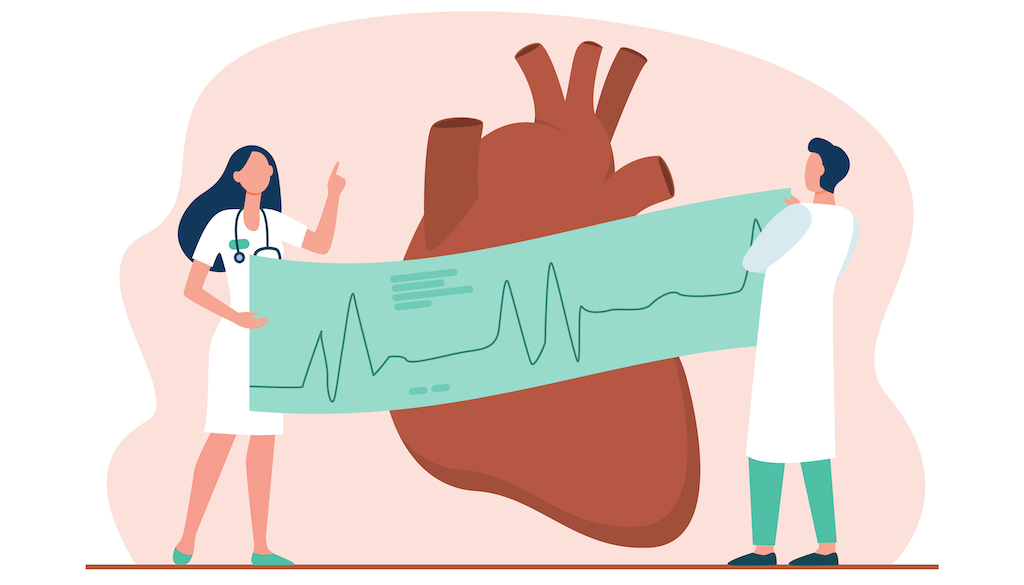Harnessing Genetics to Understand the Heart

By using the genome as their guide, clinicians and researchers can enhance diagnosis and treatment in cardiac diseases.
For most of his young life, ‘Peter’ was a happy and healthy boy. That was until he turned 11 and began to experience repeated episodes of full-blown blackouts during exercise. Peter was soon diagnosed with syncope, the medical term for fainting1.
While syncope was known to be a temporary drop in blood flow to the brain, the underlying cause remained a mystery. For instance, syncope could be caused by anything from an overreaction to triggers like the sight of blood or an irregular heartbeat—making diagnostic odyssey often a lengthy and complex affair. But for patients like Peter, a definitive diagnosis would be critical, allowing clinicians to finally prescribe the right treatment. Thankfully, an answer for Peter was just around the corner, in the form of precision medicine.
While the goal of medicine has always been to arrive at a correct diagnosis and choose the best treatment using available information, precision medicine seeks to strengthen current practice by integrating molecular, environment and even lifestyle data for more accurate diagnosis and risk stratification.
On local shores, clinician-scientists from the National Heart Centre Singapore (NHCS) have been pivotal in advancing the use of precision medicine in cardiology in recent years. Here are their stories.
A family affair
When Peter was first referred to Clinical Assistant Professor Eric Lim, a Senior Consultant at the NHCS’ Inherited Cardiac Conditions (ICC) Clinic, the team found that everything—from family history, medical history to his physical examination—was normal. The only indication of an issue was an unusual pattern on an electrocardiogram (ECG) during exercise. Even then, analysis of the ECG proved inconclusive. After all, various conditions could potentially cause the pattern, including the genetic disorder Brugada syndrome, which causes an irregular heartbeat, to arryhthmogenic right ventricular cardiomyopathy, where fatty tissue replaces normal heart muscle.
To probe the origins of the pattern, the team administered a sodium channel blocker flecainide to members of his family and see if there were any changes to their ECGs. “We didn’t dare give Peter a sodium channel blocker, because if we did and he did have a sodium channel problem, then it could be fatal,” explained Clin Asst Prof Lim.
Hoping to piece together Peter’s puzzling condition, the team turned to a fundamental tenet of precision medicine: genome sequencing. After sequencing Peter’s DNA, they struck gold by finding two mutations in the SCN5A gene, which provides instructions for making a channel that transports sodium into heart cells2.
Opening and closing at specific times to control the flow of sodium atoms, these channels play a key role in signalling the start of each heartbeat. Peter’s mutations, however, led to a truncated version of the SCN5A protein, impairing the channel’s function and causing his syncope. Remarkably, they found his sister also had one SCN5A mutation—prompting the team to continue monitoring her health in case she develops similar symptoms. By marrying clinical findings to genetics, Clin Asst Prof Lim was able to precisely explain the nature of the underlying condition and provide answers for Peter and his family.
Finding new uses for old drugs
Not only can precision medicine provide answers for the individuals like Peter, but it can also provide potential solutions. There are over 20,000 drugs approved by the US Food and Drug Administration (FDA), most of which were developed to treat one condition or symptom. Yet, in recent years, researchers have begun to expand the repertoire of such drugs by testing existing treatments against new conditions.
Assistant Professor Chrishan Ramachandra, a Senior Research Fellow at NHCS, uses induced pluripotent stem cells (iPS) to do just that. First created by Nobel Laureate Dr Shinya Yamanaka, iPS cells are made from specialised adult cells that have been reprogrammed to an unspecialised, stem cell-like state, akin to winding back the clock. Accordingly, scientists like Asst Prof Ramachandra are now working on harvesting blood cells, inducing them to the unspecialised state, and reprogramming them into heart cells—creating new cells specific to an individual patient.
He used this approach to create laboratory models of patients with long QT syndrome, a cardiac condition caused by a mutation in the KCHN2 gene that controls the transport of potassium out of heart cells. Left unchecked, the syndrome could result in fainting, seizures and in extreme cases, sudden death3.
As both cystic fibrosis and long QT syndrome are caused by defects in transport proteins, he hypothesised that medication used to treat cystic fibrosis, like the drug Orkambi, could be applied to long QT syndrome. He was right.
Incredibly, the team managed to restore normal channel function in the long QT syndrome models. The next step is to test Orkambi in clinical trials. As Orkambi is FDA-approved, they can jump straight to phase 2 clinical trials, cutting out an expensive and time-consuming part of drug development.
Plenty of room for growth
While precision medicine in cardiology is still in its infancy, the work performed by Clin Asst Prof Lim and Asst Prof Ramachandra is cause for excitement. The drivers of precision medicine such as the lowering costs of genome sequencing and a deeper understanding of biological processesare improving every day, which will only accelerate its usage in cardiology.
“Clinical genetics is starting to make an impact in cardiovascular medicine for diagnostic, prognostic and therapeutic decision making,” stated Clin Asst Prof Lim at a webinar held on 27 July 2021 as part of the SingHealth Duke-NUS Genomic Medicine Centre Seminar Series. Taken together, the future of precision medicine in cardiology is not only exciting, but inevitable.
References:
1 Syncope [Online]. https://my.clevelandclinic.org/health/diseases/17536-syncope
2 SCN5A variants: association with cardiac disorders [Online]. https://www.frontiersin.org/articles/10.3389/fphys.2018.01372/full
3 Long QT syndrome [Online]. https://www.nhcs.com.sg/patient-care/conditions-treatments/long-qt-syndrome

